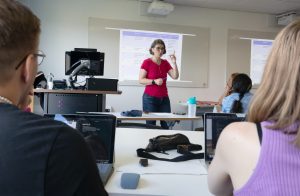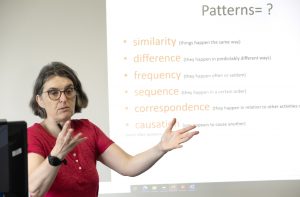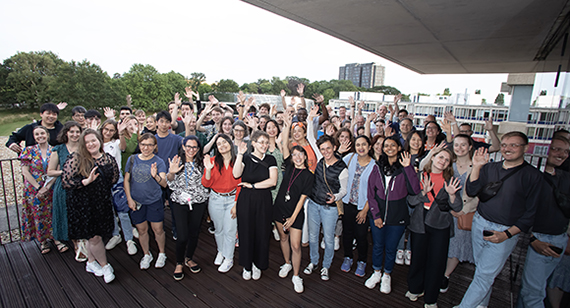Please note: This course will be delivered in person at the Colchester campus. Online study is not available for this course.

Lea Sgier spends part of her time teaching qualitative methods at the Department of Political Science of the University of Geneva (Switzerland). In the remaining time, she works as a research methods and research ethics consultant (for various European and Swiss research projects; the Luxemburg Institute of Socio-Economic Research LISER, and for the European Evaluation Academy). She is also an instructor for qualitative methodology and academic writing for a number of graduate programmes (the CUSO Doctoral Programmes in Switzerland, the Polytechnical University of Lausanne EPFL, ENS-PLS in Paris; the KiND Institute in Montreal, etc.). She has also worked in capacity building functions (for LISER in Luxemburg and in international research cooperation with the Western Balkans and the South Caucasus). From 2010-17, she was an assistant professor in qualitative methodology at (US accredited) Central European University (CEU) in Budapest.
Research wise, she has completed a project (with Barbara Lucas, HETS Genève) on institutionalised elderly people’s relation to politics and voting in French-speaking Switzerland, a project that involved small-scale ethnographic observation, qualitative interviews, an institutional survey and a legal analysis. She has also worked on gender issues in politics and on comparative old age and dementia policy. She was a member of the Steering Committee of the ECPR Standing Group on Political Methodology from 2013-19.


This course is centred on the analysis of textual data (such as interview and focus group transcripts, policy documents, archival data, media and social media data, etc.) in a discourse analytic perspective. It is intended for participants who have an interest in (and possibly already some knowledge of the discourse analysis literature), but who feel insufficiently prepared for its concrete methodological implementation (the « how to » aspects).
The course will begin with an introduction to discourse analysis and an overview of its main premises and strands (with an emphasis on the commonalities between them). This discussion will include the « classic » approaches most conventionally referred to as « discourse analysis » (namely Foucauldian DA, Critical DA, post-Marxist DA and discursive psychology), but also approaches a bit more loosely connected to this field (such as narrative analysis, big data DA or more positivist understandings of discourse as (policy) « ideas »).
We will then progress to the methodological aspects of discourse analysis (that are often either absent from the discourse analytic literature or so specific that they are difficult to implement in a specific research). Through various exercises, we will first gain an intuitive understanding of the analytic process as it progresses from descriptive analysis to more interpretive levels of analysis. We will then articulate this process more explicitly, with the help of the general literature on qualitative data analysis that (with the necessary adjustments) provides tools and works for making the analytic process less “obscure”. We will also link the analytic process as such with the writing up process that is organically linked to data analysis, and that comes with its own specific challenges.
The course consists of lectures, practical exercises (some on common course data and some on the students’ own data) and discussions of readings and examples.
The course is intended for the following types of participants :
- Participants with some knowledge and practice of discourse or/and narrative analysis who feel the need to think through the methodological aspects of their research in greater depth and detail;
- Participants acquainted with qualitative data analysis in general, but with no or little knowledge in discourse analysis, who would like to understand this universe both from a theoretical and practical perspective ;
Participants who work with data other than textual (for example videos, films, advertisements, campaign posters, political caricatures, ethnographic observations, etc.) are welcome to this course (but should be aware that we will not get into the specifics of visual analysis).
Course Objectives
The aim of this course is to provide participants with a robust understanding of discourse analysis as an applied social science method. The focus will be on understanding the methodological steps and procedures underlying discourse analytic work and to gain a solid sense of what makes a discourse analytic research credible and convincing. By the end of the course, participants should have a good understanding of how discourse analytic research works ; how analyses progress from descriptive to more interpretive levels (and what the pitfalls are in the process) ; and what to pay attention to when turning analytic results into a written-up account. They should also understand how methodological quality principles (such as validity, process transparency/replicability and generalisability) translate into discourse analytic research.
Course Prerequisites
The course is intended for the following types of participants :
- Participants with some knowledge and practice of discourse or/and narrative analysis who feel the need to think through the methodological aspects of their research in greater depth and detail;
- Participants acquainted with qualitative data analysis in general, but with no or little knowledge in discourse analysis, who would like to understand this universe both from a theoretical and practical perspective ;
- Participants who attended the Essex Summer School course « Qualitative Data Analysis : Methodologies for Analysing Text and Talk » (session 1) interested in attending a follow-up course that will go deeper into the materials covered in session 1 (especially week 2).
Participants who work with data other than textual (for example videos, films, advertisements, campaign posters, political caricatures, ethnographic observations, etc.) are welcome to this course, but need to be aware that we will work mostly with textual data.
This course can be attended as a follow-up course to « Qualitative Data Analysis » in session 1, or as a stand-alone course. Participants who are unsure which one of the two courses is more appropriate for them are advised to contact the instructor before registration.
Participants with no knowledge in either general qualitative data analysis or discourse analysis are advised to take the « Qualitative Data Analysis » course in session 1 first.
Course Reading
Instructor will provide their own digital course reader.


